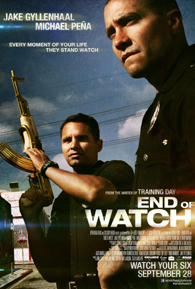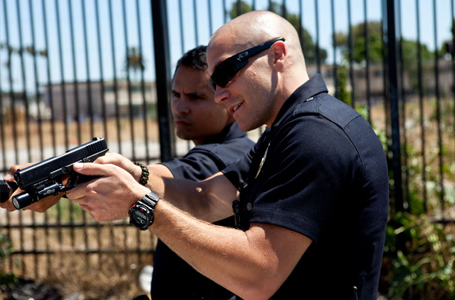
One can be forgiven for thinking one is seeing a rough print when the film opens, clearly meant to look like actual footage shot from within a police squad car, we follow the offscreen narrator, Los Angeles police officer and pre-law student Brian Taylor (Jake Gyllenhaal) as he echoes the ethos of the police as a 'thin blue line of heroes separating the predators from the prey'. We see the squad car tail another car, which eventually opens to disgorge its gun-wielding and not exactly friendly occupants.
The gimmick that this movie depends on is in its mise en scene, which regular segues from a more movie-like feel to using the 'found footage' gimmick that's mostly been used in horror films and reality shows thus far. Taylor is partnered with Mike Zavala (Michael Pena) in the same squad car. The two of them patrol a tough, mostly black neighbourhood that is right now under threat from some extremely violent and ruthless Mexican gangs. Much of the film consists of them exchanging macho male banter about their women, their lives and their philosophies as they run around LA carrying out a series of rather disjointed little missions much like those of a video game. Some of these missions involve simply beating people up, like one with a black gangster early on who challenges Zavala to a fight. One involve heroics like rescuing children from a burning house. Others involve cynical little dives into the depths of human nature like a scene where seemingly without point or purpose, two parents bound and gag their children after filing a missing persons report. Then there is the harrowing, which involve investigating seemingly ordinary houses that front as human trafficking depots and mass graves for Mexican crime syndicates. On the sidelines, there are the romantic side plots involving Zavala and his wife Gabby (Natalie Martinez), and Taylor and his fiancee Janet (Anna Kendrick). All this punctuated by the drudgery of cops doing paperwork, intradepartmental conflicts, and goofing off.
What counts for a central conflict that Taylor and Zavala are involved in is apparently a turf war being spread by the Mexican cartels into Los Angeles itself. Their representatives in LA are led by a guy called Big Evil, who leads a small group of thugs with no real defining characteristics save their excessive use of expletives and possession of yet another handheld camera they use to document their own dealings. They are first seen opening fire on a bunch of blacks in one of the film's earlier scenes, and show up late in the film going after Taylor and Zavala with machine guns when the two stumble onto the Mexican cartel's activities. While the 'found footage' gimmick is meant to give the film some overall verisimilitude, from that of recordings for Taylor's film class project (which is raised as a plot point and never touched on again) to security cameras on the border recording the activities of Mexican criminals, it quickly wears thin and feels rather unnecessary after a while.
The film's rather loose and disjointed feel, extremely thin 'found footage' gimmick, and often formulaic scenarios (I mean what can be more formulaic than two cops getting marked by criminals?) are buoyed fortunately by fine and charismatic performances by Gyllenhaal, Pena, and Kendrick especially. Kendrick, an uncommonly vivacious and spirited actress who adds buoyancy even to dreary sludge like the Twilight saga, proves all the more important here in adding some layers of levity to the proceedings as Taylor's fiancee. Gyllenhaal and Pena manage to give their scenes together a lived-in, inhabited feel with their naturalistic acting. You really do feel that these two men have a special bond that comes from working together in a dangerous neighbourhood.
End of Watch plays like a violent video game attached to first rate in-game cutscenes, buoyed by fine, charismatic performances. Those who with a fetish for uniformed services and online fragging might be compelled to check it out.

